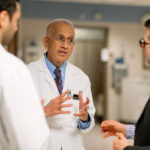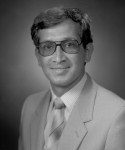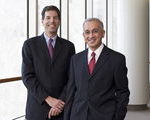Patrick Kamath, M.D. — Q&A with a legendary Teacher of the Year awardee

Patrick Kamath, M.D. (GI ’88, GI ’92), has received 10 Teacher of the Year awards from Mayo Clinic School of Graduate Medical Education and four from the Division of Gastroenterology and Hepatology in more than two decades of teaching. He’s in the Mayo Clinic School of Graduate Medical Education Teacher of the Year Hall of Fame and is a Mayo Clinic Distinguished Educator and an American Gastroenterology Association Distinguished Educator. He received the Mayo Clinic Department of Medicine Lifetime Teaching Award for Excellence in 2016.
Dr. Kamath is a consultant in the Division of Gastroenterology and Hepatology, Department of Medicine at Mayo Clinic in Rochester, and a professor of medicine in the Mayo Clinic College of Medicine and Science. He came to Mayo Clinic in 1985 as a research fellow and joined the staff in 1991. In the last decade, he has primarily taught GI fellows. In the two previous decades, he taught internal medicine residents and medical students.
What’s rewarding about teaching?
It’s rewarding to see those I’ve mentored outperform me and when they become leaders in the field. I know there’s a small part of me in there somewhere.
Two of my former residents/fellows are leading Mayo Clinic sites — Gianrico Farrugia, M.D. (I ’91, GI ’94), and Wyatt Decker, M.D. (MED ’90, I ’93). Vijay Shah, M.D. (GI ’98), who I mentored a little when he came on staff, is the division chair of Gastroenterology and Hepatology in Rochester. The majority in our division have been my fellows. It feels great to see them and other former trainees excel. When I see my former students excel at the national and international level, I proudly say, “Hey, this is one of ours from Mayo Clinic!”
How do you know when you’ve done a good job teaching?
I always give homework. When residents and fellows do their homework and come back and tell me something new — especially if they tell me something that I did not already know — I feel I’ve done a good job.
What’s your teaching style?
I like an interactive environment, and I barrage trainees with questions. I ask; they answer; I ask; they answer; and so on. I keep going deeper and deeper to make them think on their feet. I want them to remember core concepts and learn at least 10 new facts every day.
Have students changed through the years?
Students today are far more digital than I am. They’re definitely superior in bioinformatics. It’s easy for them to access knowledge and literature and, therefore, easier for them to learn.
Their enthusiasm hasn’t waned through the years.
Who were your teaching role models?
I’m from India, and I had great teachers from primary school onward. My medical teachers in India were paid a pittance but were completely dedicated to education. They were my great role models.
Sid Phillips, M.D. (PHYS ’65, I ’66), was my research mentor when I came to Mayo Clinic. He taught me how to think, do research and write. If I can communicate more clearly now, it’s because of the role he played.
My GI colleagues John Poterucha, M.D. (I ’89, GI ’92), and Tom Viggiano, M.D. (GI ’80), also are teaching role models. John is the consummate teacher and has incredible dedication to education. Tom is methodical and always exploring new teaching techniques and ways to assess the outcomes of education.
What do Teacher of the Year awards mean to you?
Awards are nice acknowledgement. But if I had to choose between an award and students learning and outperforming me, I’d forego the award any day. I want to make a difference. Nothing is more rewarding than being a mentor in medicine. Teaching someone helps patients and furthers the field.
Do you maintain contact with former trainees?
Former fellows contact me two or three times every week for curbside consultations about their patients. I’m happy to help them. I have an open-door policy; the only time I ever close my door is for confidential consultations. Any resident or fellow can walk in at any time. They know when they leave Mayo, the door doesn’t close — it’s always open for them.
Student comments
“Dr. Kamath is always willing to provide a teaching lesson and is always available to answer questions.”
“He’s incredibly knowledgeable about hepatology and medicine in general. He’s also an astonishing person.”

